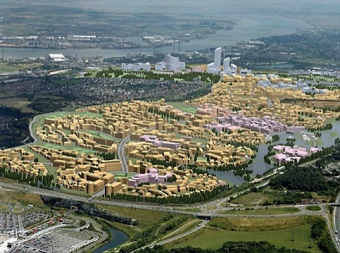WP5. Achieving urban flood resilience in practice
This underpinning WP was based in our two case study cities. It used research in WPs1-4 to establish how resilient urban flood risk management service delivery can be put at the heart of urban planning and how barriers to innovation can be overcome despite uncertainties in future urban climates, land-use, development and political leadership.
WP objectives and tasks
- Action Research that engages researchers in the urban planning process was used to accelerate uptake of innovation.
- This includes; land-owners and developers - powerful interest groups hitherto relatively neglected in flood risk management research.
- Methodologically, we built on research by the Blue-Green Cities Consortium that has identified specific scientific, institutional and social challenges currently limiting urban flood risk management innovation.
- Continuous knowledge exchange with WPs1-4 concerning challenges such as technology lock-in, maintenance concerns, institutional silos with differing goals, leadership concerns, and financial limitations enabled researchers and practitioners to modify their approaches and gain traction in delivering innovation.
Case studies
Newcastle - retrofit

The Newcastle case study investigated how urban flood resilience can be achieved through retro-fit, in the context of urban renewal
Ebbsfleet - new build

The Ebbsfleet case study investigated how urban flood resilience can be achieved in the context of new build in a ‘garden city’ (image from www.aktax.co.uk)
- Scientific, institutional, procedural and social barriers to innovation identified by the LAA were fleshed out through interviews with the relevant stakeholders, followed by Participatory Observation by researchers during meetings of the planning authorities, designers and parties responsible for implementation.
- Participatory Knowledge Mapping and Cognitive Modelling was then be applied to current decision-making processes, to identify information needs for enhanced decision making as a focus for innovative data analytics, meta-learning and data mining.
- Research findings and practitioner feedback aligned research in WPs1-4 with end-user needs.
WP team